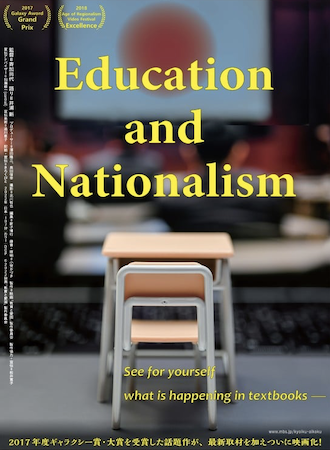
Education and Nationalism 2022
Distributed by Icarus Films, 32 Court St., 21st Floor, Brooklyn, NY 11201; 800-876-1710
Directed by Hisayo Saika
Streaming, 108 mins
College - General Adult
Education; Japan; Political Science
Date Entered: 01/05/2024
Reviewed by Laura Harris, Web Services & Distance Learning Librarian, SUNY OswegoHisayo Saika’s Educational and Nationalism focuses on changes to the Japanese educational system since the turn of the century, specifically the increased interference of government in determining curriculum. This interference revolves around how Japan’s role in World War II is portrayed in textbooks. The film focuses primarily on the issue of “comfort women,” who were forcefully recruited into sexual slavery from Korea, China, and other nearby nations. It also briefly touches on the Battle of Okinawa, during which many Okinawan civilians died due to mass suicide. Conservative politicians feel that acknowledging these atrocities will diminish students’ pride in being Japanese.
The film provides little contextual information about the history of the Japanese educational system prior to 2000. For example: Japanese textbooks are reviewed by the Ministry of Education, Culture, Sports, Science and Technology (MEXT). This examination process is a key element of the story that Saika is trying to tell. However, there is no explanation of why or how this examination process came into existence, and why it has persisted.
Saika likely omitted this information on the assumption that viewers already have a sufficient understanding of this topic. The film is narrated in Japanese, suggesting that the film was intended for a Japanese audience. It seems logical to assume Japanese viewers would have this background knowledge. That said, other viewers may struggle to understand how and why this government interference is possible in Japan, as well as the prevalence of this interference.
Despite this, the film excels in a few particularities. First, most scholarly research on textbook controversies in Japan is dated. As of late 2023, Saika’s film is one of the few accounts which discusses relevant government action from the last few years. Second, the film includes interviews with a wide variety of stakeholders, from teachers to textbook authors to government officials. Lastly, the film is likely to resonate with American viewers, especially those in the field of education. Many Japanese and American politicians share the goal of promoting nationalism at the cost of providing a nuanced, critical view of history.
Awards: Kinema Junpo Awards, Best Cultural Film (2023)
Published and licensed under the Creative Commons Attribution 4.0 license. Anyone can use these reviews, so long as they comply with the terms of the license.